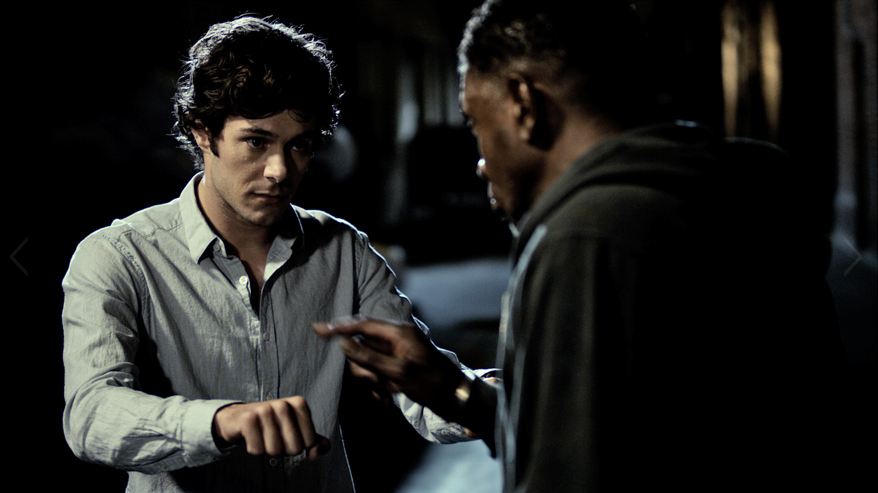Adam Brody Makes Some Winsome Wagers

ABOVE: ADAM BRODY, LEFT, IN NATHANIEL KRAUSE’S DOUBLE OR NOTHING. PHOTO COURTESY OF JEFF WEBSTER
Exploring the corrosive relationship of Clark and Becca, Nathaniel Krause’s short film Double or Nothing began as a personal thesis project—and wound up involving the intricately somber conceptions of Neil LaBute, who wrote it, and the witty banter of Adam Brody, who stars. Premiering in competition at the Tribeca Film Festival this week, Krause’s film boasts complexly interwoven stories tangled within the guise of a simple situation. The end goal of the film, Krause explained, is to show that there’s much more going on beneath the surface than what you’re willing to see.
In staging an intimate look into a failing relationship, Krause allows a glimpse into the very nature of that moment, creating perhaps a fleeting understanding of what makes a situation unravel and spiral out of control. “It’s about a character getting what they want, but maybe not what they actually need,” Krause pointed out. “If you try to run at these issues head first, at face value, you risk losing the audience—but by approaching them comically you can explore a lot more of these situations.”
With Clark (Adam Brody) walking the fine line of an endearingly witty asshole the audience can’t help but relate to, Krause cast the O.C. charmer to exude a certain allure—one that forges an organic relationship with the viewer, without risking their alienation. We caught up with Brody to discuss the role, his involvement with the film, and his own approach to break-ups.
ALICE GREENBERG: Hi Adam, thanks for taking the time out of your Sunday. Are you on set currently?
ADAM BRODY: No no, this is my day off.
GREENBERG: I thought this was a really great short; I know this is Nathaniel’s directorial debut—what was it like working with him?
BRODY: It was great—he was remarkably self-assured and confident, and I totally trusted him. I never felt like I was in the in the hands of a rookie. Plus, I’m very familiar with Neil’s work and I love his stuff, so this really an amazing project.
GREENEBRG: Nathaniel mentioned that you filmed the short in one day, with one camera. Was that challenging for you, having to establish character and plot so quickly?
BRODY: No, I mean, it was good: we filmed 15 pages of stuff which is—on anything else, even if it’s a show or a fast-paced movie, you never get more than eight or nine pages. So it was fun in a way, and it was challenging in the sense of the amount of dialogue, but not so much the pace.
GREENBREG: So this role isn’t much like the ones usually portray; what made you interested in becoming involved with the project?
BRODY: I’m a really big fan of [Neil]; he has a very distinguished voice, and you really don’t get a lot of opportunities to do these kinds of projects. [Double or Nothing] was an original piece, and I was really pleased that they asked me to do it. I had actually met Neil for a movie that he ended up not making, like six years ago, and we hadn’t been in contact since. But then they got in touch with me about this, and I was really excited to work with him.
GREENBERG: You know, it’s funny, I think this movie officially proves that under pretty much any circumstances, you convey almost an involuntary likeability. Was that a challenge for you, with this role—where I presume likeability was not something you were going for?
BRODY: No, I don’t really worry about that. I kind of argue the character’s case. So many times you’re arguing for something, almost like you’re a lawyer in a way, and so I just sort of… I mean, whether he’s likeable or not, I just sort of try to present his views or problems with the most sympathy and convincing portrayal. So I don’t really worry about that likeability factor. I try to make all of my roles likeable in some way, and this guy is too, in some way; I mean, he’s contemptible, he’s awful, but he’s funny —whether consciously or not—and he can’t really help it.
GREENBERG: Did you enjoy playing an asshole?
BRODY: Yes, I did. And it’s definitely fun to completely not worry about… I mean, with Neil, he works with such dark themes, and he’s touching on stuff you don’t really get to touch very often. He touches on subjects like race and class in a very confrontational way, in way a lot of other works don’t, and that’s fun—and it’s a nice excuse to go there.
When I first read the manuscript I was shocked at the twist, not so much at those themes, because I’m familiar with his stuff. This [film] contains a cocktail of a bunch of themes of morality and race and class and misogyny, so I wasn’t surprised that there was so many in one short film. However, I like the turn it takes and the twist in the end, which he’s so good at, too. It’s good old-fashioned irony that you almost never see. He’s got a nice reversal of expectations, and the rug is pulled from underneath you a little bit.
GREENBERG: What I found interesting was that even though your character, Clark, is kind of a jerk, he’s immensely relatable, as well. What made his character interesting to you?
BRODY: Well I mean, in the way that he’s relatable, he’s a guy that wants to get out of a relationship. He’s not that relatable for me, he’s so deluded and oblivious that he’s really doing this, and in his warped logic, him punching a homeless man in the face is a better and softer way of letting down this girl, and easier for him than if he just told her the truth. And so her going around thinking he’s just an insane violent racist shows the lengths we’ll go to avoid true confrontation. But in the sense that he’s relatable, his goals are familiar, but actions are totally warped.
GREENBERG: The film plays around with the theme of gambling, and I think that captures something very interesting: restlessness, a perpetual drive for something more. Did those themes resonate with you at all?
BRODY: Sure, I mean, in the sense that I’m always looking for the next best thing; I think that everyone can relate to that in some degree, and this notion of feeling trapped in a relationship is, I think, universal.
GREENBERG: Have you ever pulled anything like that—a less-than-traditional break up?
BRODY: Yeah. I mean, this is based on a true story of mine. I tried to get out a friendship I didn’t want to be in anymore, and I hit the guy with a car. I ran him over.
GREENBERG: You ran him over.
BRODY: I’m serious—and it helped me sever the ties with the relationship. I broke his arm; I ran him over and he lived, but he had to go to the hospital after. No, I’m just kidding. I’ve never done anything like that. I mean, I do think that sometimes you can invent more palatable or digestible reasons versions or reasons, when perhaps you don’t want to admit the truth to yourself, and sometimes we deceive ourselves—along with others—about our reasons and motives.
GREENBERG: Are you an advocate of the hard truth, then?
BRODY: Not always. Sometimes I think you gotta… sometimes it’s not right. It just depends on the situation. I just think it’s about tact, and total honestly doesn’t always run.
DOUBLE OR NOTHING DEBUTS SUNDAY, APRIL 22, AT AMC LOEWS VILLAGE 7 AND WILL PLAY THROUGHOUT THE TRIBECA FILM FESTIVAL. FOR SCREENING INFORMATION, CLICK HERE.






